- Home
- Revolutionising Dental Implant Treatments with our CBCT Scanners
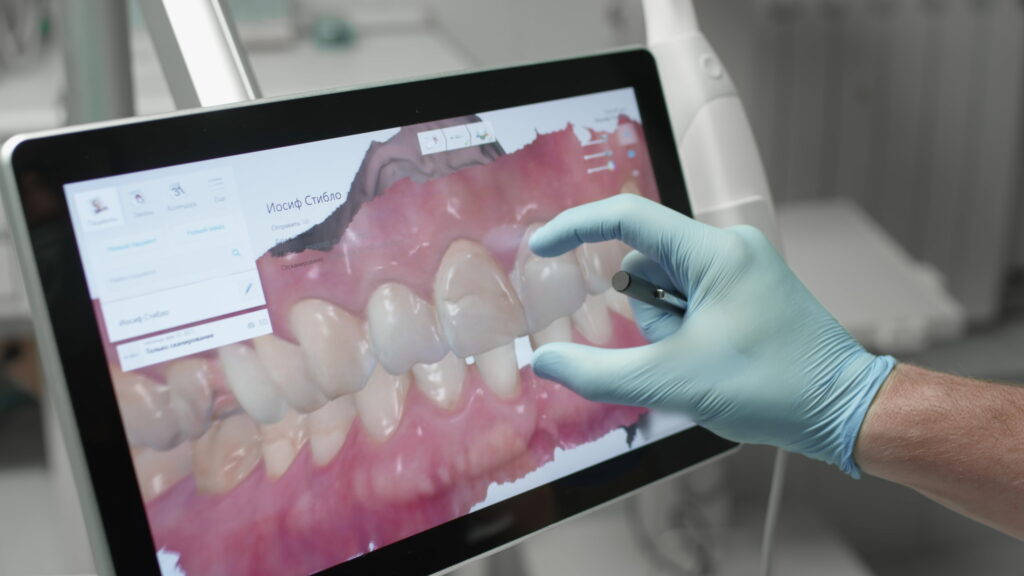
At Perfect Pearls, we are always on the forefront of the latest technological advancements, ensuring we provide our patients with the highest standard of care. Central to our commitment is the utilisation of our cutting-edge CT scanner, particularly the Gendex CT scanner, a device specially designed for dental applications.
This advanced CT scanner, specially designed for dental use, employs Cone Beam CT (CBCT) technology to produce a detailed 3D image of your mouth. Read on to find out how we employ this state-of-the-art tech and its implications for those considering dental implants.
What are CBCT Scans?
CBCT scans are a type of X-ray equipment that produces three-dimensional images of your teeth, soft tissues, nerve pathways, and bone in a single scan. Unlike traditional X-rays, CBCT scans offer a more comprehensive view of the dental structures, allowing for precise and accurate planning and execution of dental procedures.
Understanding the Importance of Jawbone Health
The foundation of a successful dental implant is the quality and strength of the bone in your jaw. When a tooth is lost, the bone in that area can begin to diminish over time. This bone loss can pose challenges for implant placement and can even affect the final results, be it a crown, bridge, or denture.
At Perfect Pearls, we never compromise. Before proceeding with dental implant treatment, we always ensure there’s sufficient bone to support the implant. If there are concerns about bone levels, we’ve got solutions—be sure to check out our Bone Grafting information to discover how we can augment bone levels if necessary.
Benefits of Using CBCT Scans in Dental Implant Treatments
Are you concerned about bone loss? This is where our Gendex CT scanner comes into play. The benefits include:
Dental-specific design: Our Gendex CT scanner is crafted explicitly for dental applications, ensuring optimal results.
Precision imaging: With its ability to generate an accurate 3D image of your mouth, we can assess the intricacies of your bone structure and dental anatomy.
Informed planning: The scanner’s 3D imaging capability enables our implant specialists to meticulously plan the best placement for dental implants and the subsequent prosthetic.
Avoiding implant failures: With such precise imaging, we can preemptively address potential issues, significantly reducing the risk of implant failures.
Why Digital Dentistry Matters

The world is moving at a fast-paced digital evolution, and the dental realm is no exception. Digital dentistry, characterised by tools like CBCT scans, not only enhances the dental procedure itself but also vastly improves the patient experience.
- Digital scans can be more comfortable than traditional methods, alleviating some of the anxieties many patients feel.
- Efficiency: With digital tools, you’ll spend less time waiting and more time enjoying their rejuvenated smiles.
- CBCT scans expose patients to minimal radiation, ensuring safety without compromising on quality.
At Perfect Pearls Dental, our priority is ensuring you’re well-equipped with information and confident in the treatment options available. During our complimentary dental implant consultations, we delve into the potential avenues for your dental health, ensuring you’re knowledgeable and comfortable with the proposed process.
Experience the difference that cutting-edge technology and compassionate care can make. Curious to know more? Reach out to us via our online form or call us directly at 01902 500823. We’re here to guide you every step of the way.
- Home
- How long do dental implants last?

Welcome to Perfect Pearls Dental Practice, where we strive to ensure your smile is as radiant as pearls. Today, we are here to delve into one of the most popular and transformative dental procedures – Dental Implants.
One of the most common questions we receive is, “How long do dental implants last?” Let’s uncover the layers to this question in this blog post, and discuss the benefits of getting dental implants.
What are dental implants?
Millions suffer from tooth loss due to decay, gum disease, or injury. The absence of teeth can significantly impair function and aesthetics, affecting one’s ability to chew food properly and smile confidently. It is a daunting experience, leaving many searching for a lasting solution.
Enter Dental Implants! Dental implants serve as a permanent solution to missing teeth, providing a strong, stable foundation for artificial teeth. These marvels of modern dentistry integrate seamlessly with the jawbone, acting as a new root for the replacement tooth and delivering a natural look and feel.
How long do dental implants last?

Not only do dental implants resolve the pain points associated with missing teeth, but they are also renowned for their durability and longevity. With proper care and maintenance, dental implants can last for 25 years or more. In many instances, they are a lifelong solution, alleviating the distress and inconvenience of tooth loss permanently. This longevity ensures uninterrupted smiles, the freedom to enjoy all types of foods, and renewed self-confidence.
However, the lifespan of dental implants depends significantly on various factors:
- Oral Hygiene:
Maintaining optimal oral hygiene is paramount. Regular brushing, flossing, and professional cleanings help in preventing infections and diseases around the implant area, thus extending the lifespan of the implant.
- Lifestyle Choices:
Healthy lifestyle choices, such as a balanced diet, limited alcohol consumption, and abstaining from smoking, contribute positively to the longevity of dental implants. Smoking, in particular, can compromise blood flow to the gums and can impair the success of implants.
- Regular Dental Check-ups:
Routine check-ups and professional cleanings allow for early detection and management of any potential issues, ensuring the longevity of the implant.
- Quality of Material and Procedure:
The quality of the implant material and the expertise of the dental professional play critical roles in determining how long the dental implants will last. At perfect pearls dental practice we use quality products, biocompatible materials with evidence based, up-to-date procedures to ensure the longevity of your implants.
- Location of the Implant:
Implants in the back of the mouth receive more strain from chewing, which can lead to faster wear and tear. However, with proper care, they can still last many years.
Tips for maintaining your dental implants
- Brush and Floss Regularly: Use a soft-bristle toothbrush and non-abrasive toothpaste to avoid scratching the surface of the implants.
- Avoid Hard and Sticky Foods: Opt for a balanced diet and try to avoid excessively hard or sticky foods that might damage the implants.
- Wear a Mouthguard: If you play contact sports or grind your teeth at night, consider wearing a protective mouthguard.
- Regular Dental Visits: Schedule regular visits to your dentist for professional cleanings and check-ups.
Living with missing teeth can be a continuous struggle, affecting not only oral health but also overall well-being and quality of life. It can lead to diminished self-esteem, altered speech, nutritional deficiencies due to eating restrictions, and can even impact social and professional interactions. The emotional and physical toll can be overwhelming, making the pursuit of a reliable remedy crucial.
At Perfect Pearls Dental Practice, we pride ourselves on providing high-quality dental care, ensuring your dental implants are placed meticulously and maintained adequately, promising a lifetime of radiant smiles.
For personalised advice on dental implants or to schedule an appointment, get in touch today. Our dedicated team is here to guide you through every step of your dental journey and help you maintain your smile’s brilliance.
- Home
- Cheapest All-On-4 Dental Implants in the UK – Guaranteed!

Perfect Pearls is not just another dental clinic; we are a team of dedicated professionals who have made it our mission to provide the best dental care at the most affordable prices. Our expertise in dental implants and commitment to our patients set us apart from other dental clinics. We understand that the decision to get dental implants is a significant one, and we are here to support you every step of the way.
Read on to find out more about our all-on-4 dental implants.
Why choose All-On-4 dental implants?
The All-On-4 dental implant technique is a revolutionary approach that allows us to replace a full arch of teeth using only four implants. This technique offers several advantages:
- Less invasive: The All-On-4 technique requires fewer implants than traditional methods, making the procedure less invasive and reducing the healing time.
- Cost-effective: With fewer implants needed, the All-On-4 technique is more cost-effective than traditional full arch replacement methods.
- Immediate results: The All-On-4 technique allows us to place temporary teeth on the same day as your surgery, so you can leave the clinic with a full set of teeth and a restored smile.
- Preserves bone: The All-On-4 technique utilises the available bone optimally, reducing the need for bone grafting procedures.
Customised treatment plan
At Perfect Pearls, we believe in providing personalised care to each of our patients. During your consultation, our dental professionals will conduct a thorough examination and discuss your specific needs and concerns. Based on this assessment, we will create a customised treatment plan that addresses your unique situation and provides the best possible results.
Affordable financing options

We understand that the cost of dental implants can be a concern for many patients. At Perfect Pearls, we are committed to making dental implants accessible and affordable for everyone. We offer a variety of financing options to fit your budget, and our team will work with you to find a payment plan that suits your needs.
State-of-the-art facilities
Our clinic is equipped with the latest technology and state-of-the-art facilities to ensure that you receive the highest quality of care. From advanced diagnostic equipment to the latest in implant technology, we have invested in the best to provide the best.
Experienced and caring team
Our team of dental professionals is experienced, skilled, and committed to providing compassionate care. We understand that the prospect of dental implants can be daunting, and we are here to answer all your questions and address any concerns you may have.
Your journey to a new smile
Your journey to a new smile begins with a comprehensive consultation at Perfect Pearls. During this appointment, our dental professionals will conduct a thorough examination, discuss your specific needs and concerns, and create a customised treatment plan. Once you are ready to proceed, we will schedule your implant surgery.
On the day of your surgery, our team will make sure you are comfortable and well-informed about the procedure. The All-On-4 technique typically requires only one surgery, during which the implants and temporary teeth are placed. After the surgery, there will be a healing period during which the implants will fuse with your jawbone. Once the healing is complete, we will place your permanent teeth.
Throughout the entire process, our team will be here to support you and ensure that you have a positive experience. We are committed to helping you achieve a beautiful, functional, and confident smile.
Perfect Pearls is the trusted name for affordable All-On-4 dental implants in the UK. With our experienced team, state-of-the-art facilities, and commitment to patient care, we are here to help you restore your smile and your confidence.
Get in touch today to schedule a consultation and take the first step towards a brighter, healthier smile.
- Home
- How to get free dental implants: UK
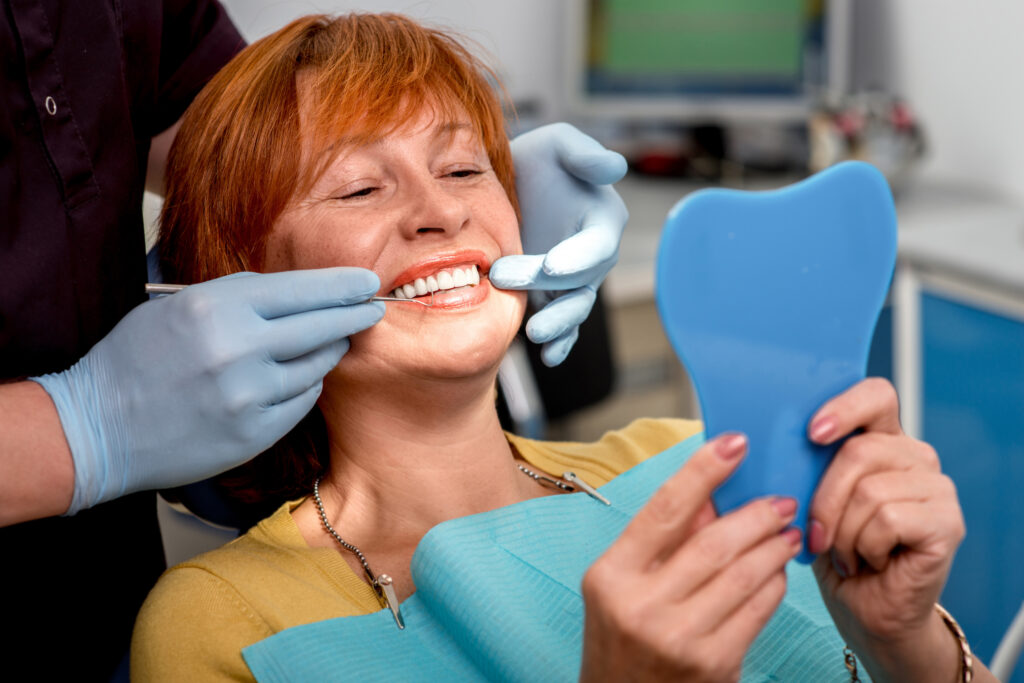
Dental implants have revolutionised the field of restorative dentistry, offering a permanent solution for replacing missing teeth. However, the cost of dental implants can be a significant concern for many individuals. At Perfect Pearls, we are committed to providing cost-effective solutions without compromising on the quality of care.
In this blog, we will help you access affordable or even free dental implants in the UK without compromising on quality. Join us as we navigate through the world of dental implants, empowering you to make informed decisions about your oral health and regain your smile with confidence.
What is a dental implant?
There’s a reason why dental implants are so sought after. They are a permanent root replacement for missing teeth. They work by a small titanium screw being placed into the gumline/jawbone. The metal then fuses with the surrounding bone to create a solid foundation for prosthetics, such as crowns, dentures or bridges, to be attached to.
Why should you replace missing teeth?
When teeth are missing, it can hinder functions like chewing and speaking, impacting our daily activities. Additionally, the loss of teeth can lead to jawbone deterioration and cause adjacent teeth to shift, disrupting proper alignment. This can further result in bite problems and changes in facial structure.
Missing teeth can also affect one’s self-confidence, as it may cause self-consciousness when smiling or socialising. Furthermore, the gaps created by missing teeth can increase the risk of dental complications such as plaque buildup and gum disease.
By replacing missing teeth through dental implants or other suitable options, individuals can restore functionality, maintain jawbone health, preserve facial aesthetics, boost self-esteem, and prevent oral health issues.
Common misconceptions about dental implants
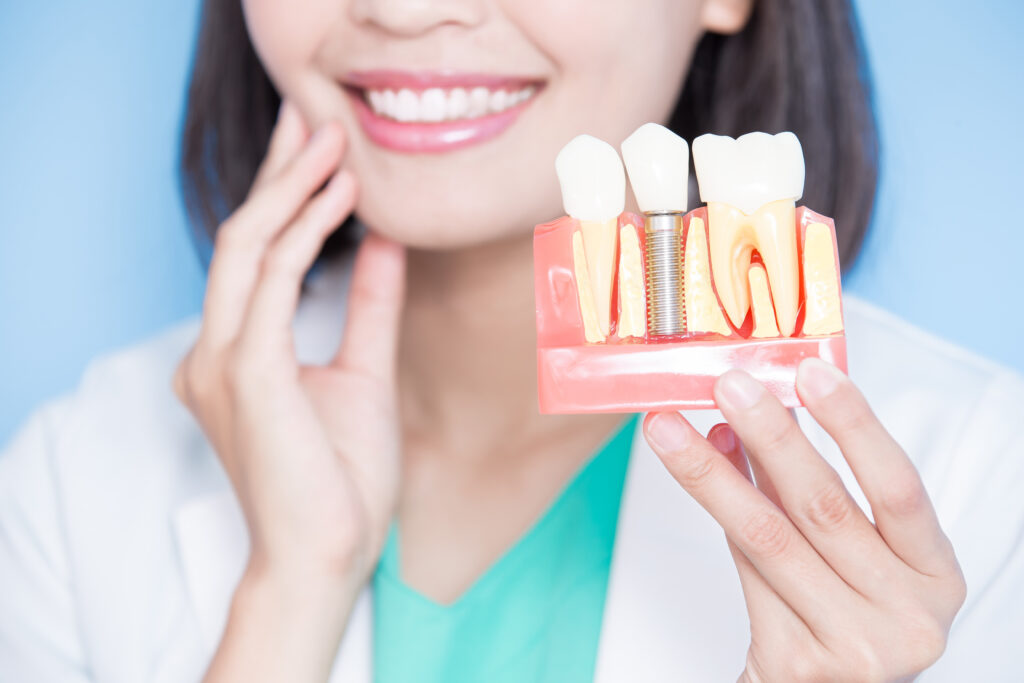
- They are painful: This is in fact false. Local anaesthesia is used during the procedure, ensuring that patients are comfortable and experience minimal discomfort.
- They look artificial: Some individuals believe that dental implants will look unnatural or noticeably different from their natural teeth. However, modern dental implant technology allows for the creation of highly lifelike prosthetics that closely resemble natural teeth in colour, shape, and texture.
- They are only for the elderly: Dental implants are not limited to older individuals. They are suitable for adults of any age who have lost a tooth or multiple teeth. Whether the tooth loss is due to injury, decay, or congenital conditions, dental implants can be a viable solution for tooth replacement.
- They are high maintenance: Dental implants do not require special maintenance beyond regular oral hygiene practices such as brushing, flossing, and routine dental check-ups. They do not decay like natural teeth, but it is essential to maintain good oral hygiene to prevent gum disease and ensure the longevity of the implants.
How to get free dental implants

The simple answer is that for the majority of people, it is unfortunately not possible to get free dental implants in the UK. This is due to the costs involved for materials and the tools used during the procedure.
The NHS doesn’t offer these as a part of their service for free if people have lost their teeth due to gum disease and poor oral health. However, there are some exceptional cases, such as if you have a genetic condition like a cleft palate, or you have lost teeth due to mouth cancer. The best solution is to have a consultation with your dentist to assess whether you are eligible, from which you will be referred to a relevant hospital.
>The good news is however, at Perfect Pearls we offer the most affordable dental implants in the UK.
The most affordable dental implants in the UK
We know that restorative dentistry can be very costly, especially when you compare typical UK dental industry prices with what can be found abroad. However, at Perfect Pearls, we offer UK patients the same low costs for dental implants as those found overseas.
Free consultation
Why choose us for your dental implants?
- As part of our Perfect Price Promise, we guarantee to meet and beat any like-for-like quote on complete implant treatment plan costs.
- We have had years of experience with treating patients seeking lower cost treatment for dental implants.
- We specialise mainly in dental implants.
- We are well versed in single tooth replacement and more complicated situations needing multiple teeth replacement with difficult periodontal issues.
- Our state-of-the-art 3D scanner helps our implant specialists to study your bone structure with accuracy.
- We offer a free no-obligation consultation (usually worth £120) to assess whether you would be suitable to proceed with dental implants.
- 0% finance options for 1 – 2 years for treatment over £3000.
While free dental implants are generally not available, we offer the most affordable dental implants in the UK, comparable to prices found abroad. With our expertise in dental implant treatments and a commitment to patient satisfaction, we offer a Perfect Price Promise, personalised consultations, and flexible financing options.
Take the first step towards regaining your smile and schedule a free consultation with us today.
Get in touch
- Home
- When is the best time to have dental implants?
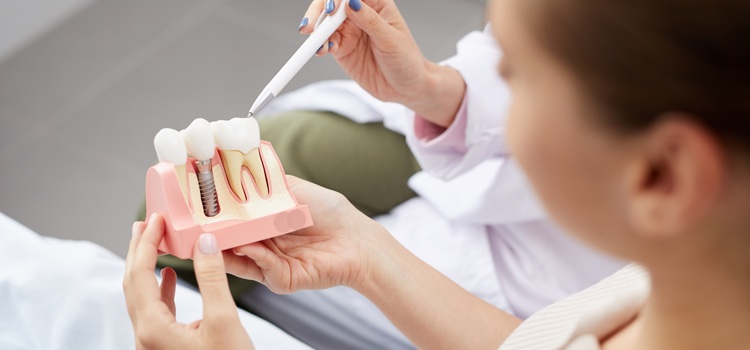
Dental implants are a highly popular treatment that offer a reliable, long term solution for missing teeth. They can also offer an attractive and comfortable alternative to dentures. But when is the best time to have dental implants? Read on to discover more.
What are the benefits of dental implants?
Dental implants are popular for several reasons. They offer a permanent solution to anything from a single missing tooth to a full replacement arch. Unlike other treatments such as bridges and crowns, they do not rely on other teeth for support and therefore do not cause any damage to the integrity of remaining healthy teeth. They are also suitable for the vast majority of patients, regardless of the cause of tooth loss.
For patients with dentures, benefits include not just a more comfortable solution but also an improved sense of taste.
Do I need to replace missing teeth?
For many patients, the greatest concern with missing teeth is the visual appearance of gaps. Many people find themselves unhappy with their smile, and this can have quite a negative effect on your confidence and sense of well being. Missing teeth can also cause discomfort and make activities such as eating and brushing your teeth uncomfortable and unpleasant.
It is also generally advised to replace missing teeth to maintain your oral health. Most importantly, when you lose a tooth or teeth, the gum is no longer stimulated. This can cause your jaw bone to become weaker and recede. As a result, remaining teeth can become increasingly unstable and at greater risk of failure. You may also develop what is known as a ‘receding jaw’, which will gradually alter the shape of your face and cause you to appear older than you really are.
How do dental implants work?
Unlike crowns or dentures, dental implants actually provide a replacement root for the missing teeth, upon which the replacement tooth or teeth are mounted. This is done by using titanium, which is biocompatible. This means that it is able to bond with the jawbone in the same way the original root would have, providing an extremely stable foundation and preventing future instability in the jaw.
These replacement roots can hold multiple teeth. Depending on the number of teeth that are missing, you may require from one to eight implants. Generally, a full upper arch requires more implants than the lower arch.
Can I have implants if I have a receding jaw?
Even if you have had missing teeth for a long period of time and are already experiencing a receding jaw, modern dental implant techniques can address this. A process known as ‘bone grafting’ is often used, which is a minor procedure that allows the jaw to be restored before placing implants. This will mean that the entire dental implant treatment takes longer, but you will be able to enjoy the same end results.
During your initial consultation, your Implantologist will conduct a thorough examination of your jaw and take x-rays if required in order to decide on a treatment plan that is tailored to meet your specific needs.
When is the best time to have dental implants?
In a perfect world, it is advisable to have dental implants sooner rather than later. Following the loss of a tooth, your dentist will be able to advise when is the ideal time, based on the recovery of your jaw and gum.
The beauty of dental implants, however, is that treatment can take place at any time. With this in mind, the best time to have dental implants is when you feel that it is right for you. If it is something you have been thinking about, we would encourage you to book a consultation with an expert today so that you can make an informed decision and discover just how quickly you could be enjoying a shiny new smile.
If the only barrier to having treatment is the cost, then you’ll be delighted to know that here at Perfect Pearls, we offer honest pricing and attractive finance packages for dental implants, meaning you can start your treatment today and pay later in affordable monthly instalments.
Not sure if dental implants are for you? Give the friendly experts at Perfect Pearls a call today and discover how easy it could be to have your smile back. Call now on Luton 01582 518100 or Wolverhampton 01902 50823.
- Home
- Are dental implants worth the price?

Dental implants are a great solution to missing teeth and have become increasingly popular in the UK. Unfortunately, they are not generally covered by the NHS. This means that they usually have to be funded from your own pocket. If you have been considering dental implants then you have likely approached a few different dentists to find out about the costs involved. You might even have found yourself wondering if they are really worth the price. To help you make an informed decision, let’s take a closer look at the benefits of dental implants and what you really get for your money.
An investment in your confidence
A significant proportion of UK adults suffer from one or more missing teeth. Whilst the dental implications are obvious, there is another aspect of missing teeth that is easy to overlook – the impact on your confidence and overall wellbeing.
Research indicates that people with missing teeth commonly experience low self-esteem, a loss of confidence and a lower sense of wellbeing. The result can be a significant impact on people’s personal, social and professional lives.
Professionals who suffer from missing teeth are often reluctant to give presentations, take the lead in meetings and pitches and will often avoid interviewing for new jobs or promotions. As a result, they are at risk of missing out on opportunities they deserve – and consequently not earning to their full potential. With this in mind, dental implants may prove to be well worth the investment.
Many people with missing teeth will become increasingly reluctant to appear in selfies and family photographs. Others may withdraw entirely from social occasions – leaving them isolated and at a higher risk of other health problems such as depression. Social isolation can be particularly undesirable for older patients who may already find that their opportunity to interact with others is limited.
If you have lost an entire arch and wear dentures, implants can be used to support a fixed replacement. As well as significantly improving comfort, this will also eliminate the need for a plastic plate on the upper teeth. As a result, you could also experience an improved sense of taste and rediscover the pleasure of eating.
As a result, many older patients discover a new lease of life after dental implant surgery.
An investment in your future oral health
There are several reasons why your dentist will likely recommend that you replace missing teeth. Firstly, your oral hygiene is an important consideration. Gaps in your teeth can be sensitive and hard to reach, meaning that you either avoid brushing them because of the discomfort, or simply can’t reach some areas effectively. This puts your remaining teeth at a greater risk of decay and may eventually lead to further tooth loss.
Over a prolonged period of time, the jaw bone will slowly begin to weaken where teeth are missing. This is because when you chew, vibrations travel through the roots of your teeth and encourage healthy growth of the jaw bone. With a missing tooth, this stimulation no longer occurs and eventually the jaw can begin to weaken and recede. Not only does this increase the risk of losing more teeth in the future, it can also cause the appearance of early ageing as your jawline slowly changes shape.
How do dental implants actually work?
A dental implant actually consists of three key components – the implant, the abutment and the crown.
The implant is the most important part. This is a replacement for the root of the missing tooth and is made from biocompatible titanium. This is able to fuse with the existing bone in your jaw, restoring strength and providing a solid foundation for your new tooth or teeth that is as good as the original root. Alternatives such as traditional crowns and bridges do not offer this.
The abutment is mounted on the implant and allows the crown to be fitted. The crown is the visible part of the new tooth. This will be coloured and shaped to look and feel just like your natural teeth, so that once you have completed the treatment, you’ll forget you ever had missing teeth. Unlike traditional crowns, it will be supported by a root of its own and not rely on other teeth, meaning that the integrity of the surrounding teeth is not compromised.
Because dental implants do not rely on your remaining teeth, they are also a suitable option for almost every patient. Even if you have already begun to experience bone loss, this can usually be rectified during treatment. In some cases, a process known as bone grafting may be required.
A lifelong investment
When you choose Perfect Pearls, you can be sure that your implants will fitted by an experienced implantologist. We use the highest quality materials from the best possible sources.
Our clinic is based in Wolverhampton, where you’ll be supported by an expert team who’ll make sure that you are comfortable and reassured throughout the treatment, as well as providing all the aftercare you need.
As a result of the exceptional care we take from the outset, our patients can enjoy the benefits of their dental implants for years to come. This can often be a lifetime with the correct approach to oral hygiene.
We support and encourage our patients to take a proactive approach to oral hygiene and attend regular checkups as advised by the team. This is to make sure that they get the best possible lifespan out of your implants.
Spread the cost with interest free finance
When you consider the many benefits, it is easy to see that dental implants are well worth the investment – and with our attractive finance options they could be even more affordable than you imagined.
Get in touch today and discover how soon you could be able to benefit from a fully restored smile. Call now on 01902 500 823 to talk to a dental implant expert.
- Home
- Should I floss my dental implants?

Flossing, in addition to brushing twice daily, is now known to significantly improve oral hygiene and reduce the risk of tooth decay. An encouraging number of people have added the habit their daily dental hygiene regime. However, not everybody is aware that flossing is just as important for looking after dental implants as it is natural teeth. Flossing helps them to stay strong and healthy for as long as possible. But which should you do first – brush or floss? In research recently published by the Oral Health Foundation, this long-standing question has finally been answered.
Why floss?
Using floss or interdental brushes plays a major role in improving oral hygiene. They decrease the amount of food debris that is stuck between the teeth. In particular, it allows you to tackle hard to reach areas that a standard toothbrush just isn’t able to clean effectively. An interdental brush or traditional floss can also help to remove bacteria build ups that aren’t even visible to the eye.
Flossing combined with good brushing is therefore highly effective in preventing plaque build-ups. These build-ups are the single biggest cause of tooth decay. This is as important for people who have dental implants as it is for anybody with a complete set of natural teeth – and as part of a wider oral hygiene regime may help to ensure that your dental implants last an entire lifetime.
Which should I do first?
The Oral Health Foundation concluded that people who used interdental brushes to clean their teeth before brushing were left with a much cleaner mouth than those who did it afterwards. The use of interdental brushes helped to remove or loosen harder to access build-ups prior to brushing. This allowed them to be removed more effectively by the regular toothbrush, leaving the teeth as clean as possible.
One of the reasons flossing or using interdental brushes is so important is because normal brushing on its own only effectively cleans three of the five surfaces of our teeth. Performing an initial clean using an interdental brush leads to significantly improved brushing results.
How do I use an interdental brush properly?
The Oral Health Foundation recommends the following approach for best results:
Choose a size of brush (typically 0.4mm to 1.5mm) that fits between your teeth comfortably without using much force. You may find you need a couple of different sizes but the best way to find out is to ask your dentist or hygienist the next time you have an appointment.
- Hold the interdental brush between your thumb and forefinger.
- Gently place the brush through the gap between your teeth – don’t force the brush through the gap.
- Brush in and out of each space between your teeth.
Why use fluoride toothpaste?
Using a fluoride toothpaste from a reputable manufacturer is also recommended as part of a good oral hygiene regime. Over time, plaque on the surface of your teeth causes acids to seep into the pores of the enamel and break down the internal structure. This process is known as demineralization. It can create a weak spot in the tooth, which may develop into a cavity if left untreated. Fluoride is a naturally occurring mineral which can help to slow down this process by making it harder for acid to penetrate the enamel, giving your teeth an extra line of defence.
Do regular check ups matter?
Even if you maintain a good oral hygiene regime that includes daily brushing and flossing, you should still ensure you have a regular dental check up, whether or not you have dental implants.
A dentist is able to identify and treat problems with your teeth before they are able to develop into anything more serious, including signs of gum disease and other problems which are invisible to the untrained eye. Your dentist can also refer you to the hygienist who will be able to offer a range of prophylactic options as well as advise you on the best way to look after your teeth and gums so you can keep on smiling with confidence for years to come.
“At Perfect Pearls, we care as much about your smile as you do. That’s why we have a range of quality flossing/interdental brushes available to support your implant treatment, and offer all of our patients a session with our hygienist on how to care for their new implants from the very beginning.”
To book an appointment now with Perfect Pearls Dental Implant Centre, call today on 01902 500 823. Alternatively, click here to book a free, no obligation consultation.
Source: https://www.dentalhealth.org/news/which-comes-first-brushing-or-flossing-new-study-shows-that-we-should-clean-between-our-teeth-before-brushing
- Home
- Are Dental Implants Right For Me?
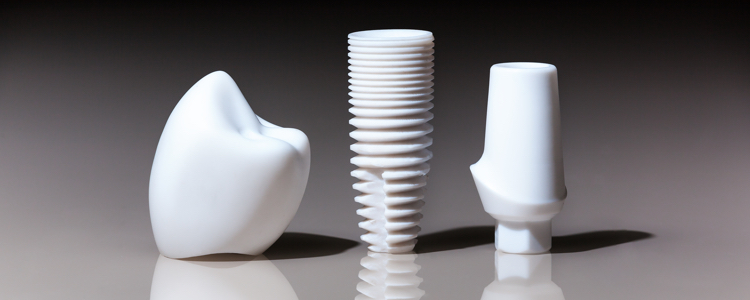
The fact that you are reading this article means you have probably been thinking about dental implants and whether or not they are a good choice for you. Although many adverts market them as the perfect, permanent solution to missing teeth, it is completely natural that you should have questions and concerns. Here at Perfect Pearls, we completely understand that you would want to make a fully informed decision before undergoing any dental treatment. We believe in providing the best possible information along with excellent dental care, so that our patients always leave with a happy smile.
Why are dental implants recommended?
Your dentist will usually recommend that you opt to have missing teeth replaced. One of the main reasons for this is that if gaps are allowed to remain for a prolonged period of time then you can begin to experience significant problems with your remaining teeth. Weakening of both the jaw and other teeth around the gap can cause failure and loss of other teeth, as well as making it hard for you to maintain your oral hygiene. This, in turn, can also put your remaining teeth at greater risk of damage and decay.
From an aesthetic perspective, few people are happy with having missing teeth, which can seriously undermine our confidence and self-esteem. For some people, this can have very real effects on our personal and professional lives.
One particular reason dental implants are often recommended over bridges and crowns is that they do not have a negative impact on the integrity of the surrounding teeth. They also don’t rely on the remaining teeth being strong enough. They offer a permanent solution that is suitable for almost every patient and leaves them with a smile that looks and feels completely natural.
Why replace my missing teeth?
As we’ve already mentioned, for many patients the primary reason for choosing to replace missing teeth is aesthetic. Although missing teeth affect everybody differently, a range of studies have shown that gaps tend to have a very negative effect on most people’s confidence, sense of self-esteem and even their lifestyles. In some cases, this may cause people to avoid smiling and laughing, while some may find themselves covering their mouth when speaking which can have an impact on communication. In the most extreme cases, the lack of confidence can even make people reluctant to socialise or apply for new positions. This can have a negative impact on friendships, relationships and career satisfaction. All of these are perfectly good reasons to consider replacing your missing teeth.
Of course, there are also dental considerations. There are some very important longer term consequences to your teeth and gums when you suffer from missing teeth. The chewing action when we use our teeth to eat stimulates the bone in our jaw and helps to keep it strong and healthy. When a tooth is missing, this sensation is lost, causing the bone to weaken and recede over time. This weakness can spread across a wider area, increasing the risk of other teeth becoming unstable or even failing completely. Receding bone also affects your bite which may result in excessive wear and discomfort. It can also cause the appearance of early aging as your jaw begins to change shape over time.
What exactly is a dental implant?
A dental implant comprises of three components. Firstly, there is the implant itself. This is essentially a replacement root. Made from biocompatible titanium, it is able to bond with the natural bone to form an incredibly strong, permanent root for your replacement tooth and help to strengthen the jaw against further weakness.
The visible part of the replacement tooth is called a crown. The crown looks and feels just like your natural teeth, so that nobody will ever know the difference.
Connecting these two parts is a component called the abutment. When you first have implants fitted, a temporary abutment will often be used to protect the implant until it is ready for the crown to be mounted.
Does dental implant treatment hurt?
For many patients, this is the most important question, particularly for those who may have experienced discomfort and pain with their teeth in the past. The dental implant procedure is carried out under local anaesthetic and performed by highly experienced implantologists. They will take great care to ensure that you feel nothing at all during the treatment.
Dental implant surgery is a minor surgical procedure, however, therefore light discomfort may be experienced by some patients. Your dentist will advise you on the best way to manage any discomfort before you leave the clinic and of course we’ll always be here to help should you have any questions or concerns at any time following your treatment.
Are dental implants safe?
Our implantologists are experts in their fields and always use the very latest techniques and equipment for the best possible results. We only use the highest quality implants and combined with excellent dentistry, this allows us to ensure patients that both the surgery and the implants themselves are completely safe.
How long do dental implants last?
When you have top quality implants fitted by expert dentists such as those available here at Perfect Pearls, you can expect your implants to last a lifetime.
A lot depends, however, on how well you look after your teeth. For the best long term results, you should treat your implants just as you would your normal teeth, adopting a good oral hygiene regime and following any advice given by your dentist or hygienist. We also encourage you to visit your dentist at the recommended intervals so that we can give your teeth and gums a thorough examination.
To book a free consultation with the experts at Perfect Pearls Dental Implant Centre, call us today on 01902 500 823. Alternatively, fill in the online form on our dedicated implants page.
- Home
- How Long do Dental Implants Last?

Dental implants are now one of the most popular and effective ways to replace anything from a single missing tooth to an entire set of teeth. They are suitable for almost everybody and are often marketed as a permanent solution. One common question from patients is whether or not such claims are true. In this article, we take a closer look to help answer the question of how long dental implants last for.
Why have dental implant treatment?
When it comes to missing teeth, for many people the main concern is the visual effect. People tend to lose their confidence and become very self-conscious when they have visible gaps, and this can have an impact on many different areas of life – from not wishing to participate in family photos to avoiding social occasions with friends and colleagues. It can also put people off applying for promotions and new jobs.
In addition, there are very good dental reasons to replace missing teeth. If a gap is left for a long time, there is no natural stimulation of the jaw and gradually the bone in the jaw around the gap begins to sink away – something known as bone loss. This can weaken the jaw and put other teeth at risk of moving or failing. It can also cause the appearance of early aging.
How does a dental implant work?
Although a dental implant itself is technically only a replacement root, the term ‘dental implant treatment’ is generally used to describe the entire process of replacing a missing tooth or teeth.
The dental implant is a substitute for the missing root and forms the foundation upon which a new tooth can be mounted. It is essentially a small screw which is made from titanium. Titanium is used because it is biocompatible, which means it is able to bond with the bone. Once fully fused, this makes it as strong as an original root, which gives maximum stability to the replacement tooth and also helps to restore strength in the jaw.
A crown is used to replace the visible part of the tooth. This is an artificial tooth that is specially made to be the same shape and colour as your existing teeth, allowing it to blend in perfectly with your other teeth.
Finally, there is a component known as an abutment, which is used to connect the crown and the implant together.
How long do dental implants last?
As we’ve seen in the previous section, a dental implant replaces the actual root and not just the visible part of the tooth. Because of this, the treatment is much different to normal crowns and bridges and can be expected to last much longer.
Every patient, however is unique and it is important to be aware that there are many factors that affect how long dental implants last. Firstly, the quality of the components and the standard of dentistry is of the utmost importance. Here at Perfect Pearls, we have over 18 years’ experience in affordable, high-quality dental implant treatment and have many satisfied patients.
Another important factor which will determine how long your dental implants last is the bone they are fitted to. This is why it is so important that a comprehensive examination by an experienced implantologist is conducted prior to treatment, who can arrange for additional dental work to be done beforehand if needed.
Finally, the lifespan of your dental implants depends on how well you look after them. You should look after your new replacement teeth just like would your natural teeth. The better you care for them, the longer they will last. With a good oral hygiene regime and regular dental check ups, you can expect your dental implants to last for as long as your other teeth, and often a lifetime.
Here at Perfect Pearls Dental Implant Centre, we offer the very highest standards in dental implant treatment at some of the best prices available in the UK. To find out more and book a consultation call today on Wolverhampton 01902 500823, view more options online.
- Home
- Does Dental Implant Treatment Hurt?

The chances are that like most people, if you hear the word dentist you immediately think pain and discomfort. You may have had a bad experience in the past with toothache or had a tooth extracted. You may have simply heard one too many horror stories about everybody else’s. Although a dental emergency may be painful and require a visit to the dentist, the truth is that with the modern techniques and advanced training of dentists today, it is rarely the procedure itself that is painful.
Regardless, we tend to avoid going to the dentist because of our nature as humans. Even when it is in our best interests. This is especially true of dental implants. If you are suffering from missing teeth and have been considering dental implants, but have found yourself worrying about whether or not the treatment hurts, do not fear – you are not alone. Let’s take a closer look at the process and help to put your mind at rest.
Why get dental implants?
Dental implants are a permanent solution to missing teeth. Unlike other options, they do not have an impact on your remaining, healthy teeth. They provide you with the most stable and natural looking replacement. They also help to strengthen the jaw by replacing not just the missing tooth but also the root.
Apart from the obvious visual implications of missing teeth, which can severely undermine our confidence and sense of self-esteem, there are also hidden dangers of missing teeth. Over time, these can cause more problems. This can include weakening of the bone which can lead to damage or failure of other teeth and a receding jaw – which often has the effect of causing us to look older than we are. This happens because when we chew, our teeth help stimulate the bone below and keep it in a healthy condition. If a tooth is missing, this does not happen and the jawbone gradually begins to deteriorate.
As well as helping you to look and feel great again, dental implants are a great way to protect yourself from the chances of such problems arising.
How do dental implants work?
Dental implants are actually comprised of three elements, known as the implant, the abutment and the crown.
It is the implant that plays the most important role, as this helps to restore strength to the jaw as well as forming a strong base upon which the new tooth – the crown – can be mounted.
A dental implant is made of high-quality titanium, which is biocompatible. This means that it has the special property of being able to bond and fuse with the natural bone around it. This means that it becomes an integral part of your jaw.
Once the implant is fully bonded, the abutment can be fitted, and finally the crown – and your smile is restored.
What does the fitting process look like?
After your initial consultation and any preliminary treatment, the actual process of fitting your dental implants typically has four main stages.
The first step is to numb the gum with anaesthetic. A surface anaesthetic is used first to freeze the gum. This allows the local anaesthetic to be injected without you feeling anything. Once this anaesthetic has started to work, you will not feel anything at all.
Once this first stage is ready, the next step is to prepare the site for the implants. The dentist will need to make a small opening in the gum in order to gain access to the bone.
The dentist will then drill what is known as a pilot hole. This allows the dentist to check that the position and angle are correct. The hole will then be gradually widened to the correct width for the implant to be inserted.
Finally, the implant can be screwed into place and sealed off, and the gum around the area stitched.
It is important to remember that the entire process is a planned, precision procedure. Don’t think of it as something like a tooth extraction or other emergency treatment.
What about recovery?
As with any dental treatment, everybody’s experience is different. However, the vast majority of patients state that they feel nothing more than mild discomfort afterwards, most often during the healing stage. They are often pleasantly surprised by the lack of any pain during the procedure itself.
In order to keep you feeling comfortable, your dentist will prescribe painkillers and a special mouthwash for use after your implant procedure and go through what you need to do to ensure quick and successful recovery. Of course, we’ll never be more than a phone call away should you have any questions or concerns.
It will also be necessary to return about a week after treatment to have the stitches removed, although this will also be done painlessly.
Why wait for your perfect smile – call us today
If you are interested in dental implant surgery and would like to find out more or book your initial consultation, don’t hesitate to call the expert team at Perfect Pearls today on Wolverhampton 01902 500 823. Alternatively, see more ways to get in touch online.
- Home
- How Much Do Dental Implants Cost?
Cost of dental implants? Dental implants have become increasingly popular in recent years, and more and more dental practices are advertising low-cost implants.
At Perfect Pearls Clinic, we believe in offering honest and transparent pricing.
We want our patients to be confident that the price they see is the price they pay.

Before looking at the cost of dental implants, let’s see what a dental implant is.
Three key components are combined to form an artificial replacement for the all-important root that holds the tooth in place, along with a natural-looking crown.
The three parts of a dental implant are:
- The implant: a replacement for the root of the missing tooth which provides an incredibly strong base upon which the replacement tooth can be mounted.
- The abutment: a connector and links the implant and the crown together.
- The crown: a permanent, replacement tooth that is mounted on the implant (and the only visible part).
If you are looking at prices for dental implants, be sure to check that the price you are seeing includes all three components and not just the implant itself.
The price for these components is usually given per single tooth.
What does dental implant treatment involve?
There is a lot involved in the process of fitting dental implants.
It is a good idea to be familiar with the process before making a decision.
This means you will know what you are paying for from the outset and not have to worry about any unexpected extras.
Step 1. Implant Consultation
The Dental Implant process begins with a consultation.
This will allow the dentist to discuss:
- What is involved with you;
- Talk about your expectations and answer any questions you may have;
- And prepare a fully formed treatment plan for you.
At the end of the consultation you will have the agreed costs of the entire treatment.

Step 2. X-Rays & bone density
For successful, long-lasting dental implant treatment, it is important that the bone density is satisfactory and that there is a sufficient amount of bone in the location.
X-rays, if required, will be taken at your initial consultation.
In some cases, it will be necessary for bone grafting and/or a sinus lift to be carried out before it is possible to proceed with implants.
Step 3. Prophylactic hygiene treatment
It’s also important that the teeth and gums are as healthy as possible for the treatment to be a success.
Before beginning the implant process, we conduct a Prophylactic Clean which serves to clear the gums and mouth of any harmful bacteria.
Step 4. Implant fitting
Once everything is in order, it will then be possible for your dentist to begin fitting your implants.
First the implant itself – the replacement root – will be fitted into place and protected with a temporary abutment.
Once the implant has bonded properly, the final abutment and crown can be fitted.
Step 5. Aftercare medication and cleaning
Although the process itself is generally straightforward and painless, because of the nature of the treatment aftercare medication is required to prevent infection and discomfort.
Finally, you will be advised of the best techniques to look after your fantastic new smile.
The cost of dental implants
Here at Perfect Pearls, we pride ourselves in our transparent pricing policy.
The prices for one to three replacement teeth are as follows:
| Single Tooth |
2 Separate Teeth |
3 Separate Teeth |
| £680 Implant |
£1,360 2 x Implants |
£2,040 3 x Implants |
| £365 Porcelain Bonded to Metal crown (PBM) |
£730 2 x PBM Crowns |
£1,095 3 x PBM Crowns |
| £195 Abutment |
£390 2 x Abutments |
£585 3 x Abutments |
£30 Xray package
|
£150 Xray package |
£150 Xray package |
| £110 Hygiene package |
£110 Hygiene package |
£110 Hygiene package |
| £85 Perfect Planning package |
£200 Perfect Planning package |
£200 Perfect Planning package |
| £20 Aftercare medication |
£20 Aftercare medication |
£20 Aftercare medication |
| Total Price: £1,485* |
Total Price £2,960* |
Total £4,200*
|
Yes! I’m interested
Any additional costs will always be highlighted at the initial consultation so that you are fully aware of all treatments/costs.
Nothing is hidden or brought up mid-treatment.
The price outlined on the Treatment Plan is the price you pay.

Spread the cost with finance options
High quality, expert fitted dental implants are a real investment in your future health and happiness.
For treatment plans of between £2,500 to £3,499 in cost we’re happy to offer a low-interest finance arrangement at just 9.9% APR with terms of up to 5 years, whilst for treatments costing £3,500 or more, interest free finance over 1 to 3 years is available.
Yes! I’m interested
To enquire about low cost implants with the UK’s leader in the field, get in touch with the experts at Perfect Pearls Dental Implant Centres now on Wolverhampton 01902 500823 or alternatively book a consultation online or request a call back .
* Please note that prices are correct at time of publication and may vary. Please request the latest pricing when making an enquiry.























